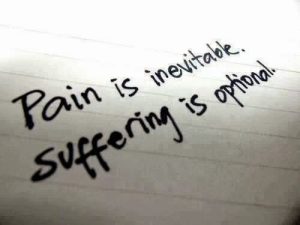Want to learn a new coping skill? Let’s talk about one that’s relevant to anyone with a brain and a beating heart.
First, let’s outline the 5 broad choices we have during life’s challenges. In no particular order:
- Figure out how to solve the problem.
- Change how you feel about the problem.
- Stay miserable.
- Make things worse.
- Accept the situation.
Coping via distraction or avoidance has benefits in some situations, some of the time, but I find people far overuse them, and sometimes this makes their situation worse.
When you can’t solve or change your feelings towards the problem, consider the skill of Radical Acceptance.
Coming from a school of psychotherapy called Dialectical Behaviour Therapy (DBT), this skill originated out of Buddhist philosophy, and was translated for use in our Western culture.
This is a skill for when your life isn’t the way you want it to be. Which means this is a skill for all of us at many points in our life.
Radical acceptance means accepting this moment, exactly as it is, and accepting that this moment couldn’t be any other way given the multitude of circumstances and events that have led up to it. RADICAL refers to a comprehensive, a complete and total accepting, using your mind and body.
Important:
It doesn’t mean we need to approve of the situation, or be happy about it. It’s not about giving up. Many of us are living through hellish moments, and this skill is not used to invalidate the pain of the moment. It’s the skill of no longer rejecting the reality of the situation and tapping into your willingness to accept the moment as it is.
Here’s the math formula: Pain + non-acceptance = greater suffering.
Introducing acceptance into the equation, you reduce suffering. Pain, however, will remain. This too needs to be accepted so that it can be addressed. Changing reality first requires an acceptance of reality.
How?
It’s not a passive skill. Hit your internal pause button for 1 min, take a breath.
Listen to the storyline in your head. You may hear sentences that start with “It should be”, or, “it’s supposed to be”, maybe “why isn’t it this way”, and “if only (x,y,z) happened instead”. You’re now recognizing that you’re fighting reality, and you’re at a fork in the road. One direction leads towards the active practice of Radical Acceptance, the other leads towards the familiar and seductive suffering, wishing the moment was different.
Now, tune in to the sensations in your body. For this exercise, don’t interpret a feeling state as evidence for why your storyline must be followed, thus returning to you to the state of rejecting reality. This is a major speedbump for practicing Radical Acceptance. We often are overwhelmed by a feeling state that tells us to engage a well-walked unhelpful storyline. Intense anger, unbearable sadness, guilt about our behaviour, or shame about something about you, can all make acceptance extra difficult.
Then, turn your mind willingly towards accepting the reality of the moment. The word willingly is purposeful. You have to make this a purposeful decision. To help this, remember that our body gestures influence the neurophysiology of our brain. So, turn your palms upwards on your lap. Relax your forehead/eyes/stomach. Allow your shoulders to drop. Take a nourishing breath. Permit a small half-smile to form, what I call the “Mona Lisa” smile. Remind yourself that everything has a cause. Remind yourself that life can be wonderful and bittersweet, even with these painful situations. Remind yourself that it’s ok to grieve the loss of how you wished reality to be different than what it is.
Radical acceptance generally takes a long time, and requires intention and willingness to turn the mind towards acceptance, over and over sometimes for months or years. You’re working on pruning old neuro circuitry that doesn’t serve you, and bushwhacking a new neuro path. This takes time, and, is achievable with practice.
Takeaways:
- In situations where you can’t solve the problem or change how you feel about it, pain will remain no matter what you do.
- Pain + non-acceptance = greater suffering.
- Radical Acceptance is not a passive action.
- Radical Acceptance can be the first of many skills to use when coping.
- You only have to accept the past, and, this moment. You can work on changing the next moment.
For more info, coaching, or counsel, book a free consultation with one of our registered social work therapists.

